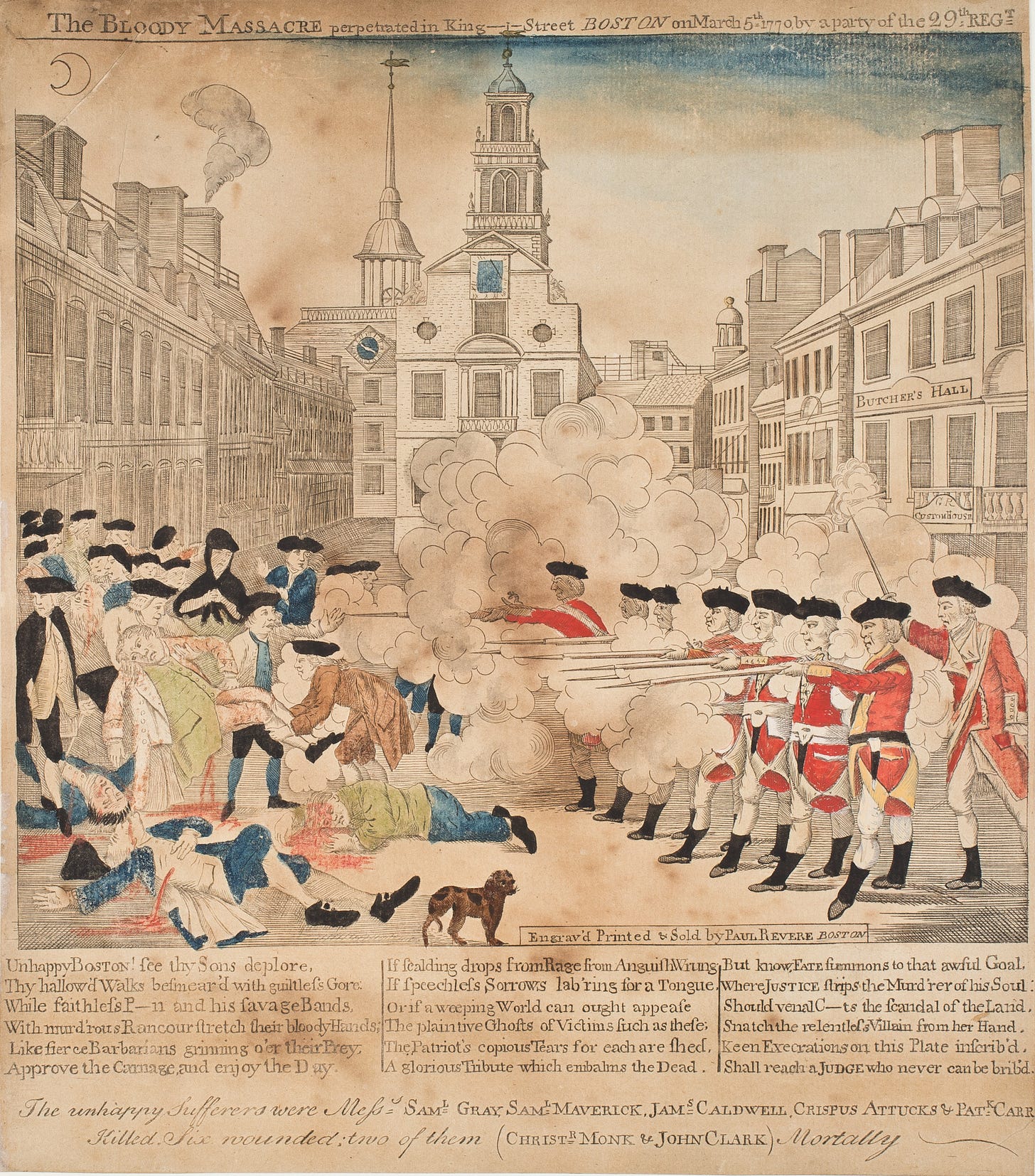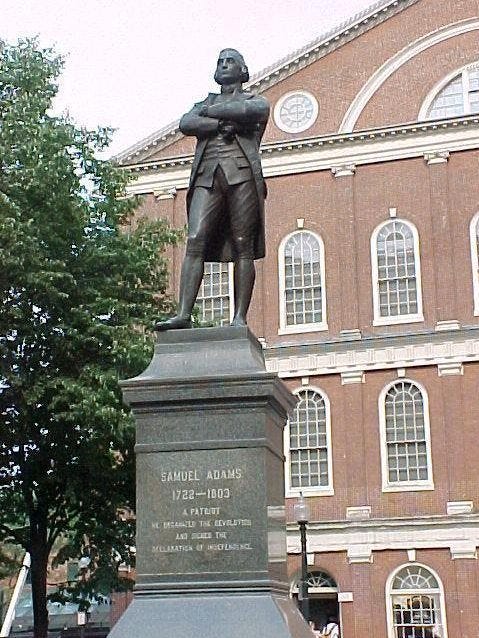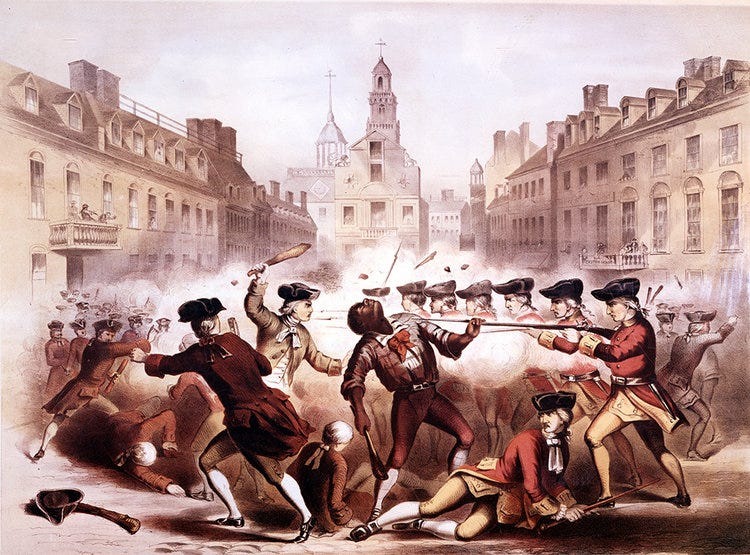TEMPORARILY UNLOCK’T
Today, March 5, is the anniversary of the famous Boston Massacre. One of the most celebrated stories connected with that event is the one where John Adams, a youngish lawyer and Massachusetts patriot, defended British soldiers charged with killing unarmed civilians who had been protesting the city’s occupation.
Adams opposed what he and his cohort saw as British tyranny, so his decision to defend the soldiers is routinely presented as a classic American exercise in personal bravery and political independence. High regard for the rule of law and commitment to any defendant’s right to a defense, the story goes, inspired Adams to buck popular opinion—and his own colleagues in the resistance—and risk reprisal for taking the soldiers’ case.
The story even made one of the chapters in the young John F. Kennedy’s ghostwritten book Profiles in Courage. There was a TV show based on that book in the 1964-65 season, which must be the first time I ever heard of John Adams. He was played by David McCallum. And he also played my idol Ilya Kuryakin on “The Man from Uncle.”
Anyway, John Adams’s breakaway from his political allies, on a matter of pure principle, makes for a strong and resonant story, but it’s not true, and that’s not me being contrarian; it’s the assessment of every important scholar who’s ever looked into the situation. So it’s a bit strange that we keep telling the story.
To quickly review the violent event itself: Eight nervous soldiers, commanded by a captain, had been enduring a long standoff that cold night in 1770, hoping to protect the Customs House from an increasingly unruly mob that had grown to as many as 400, wielding clubs, throwing objects, threatening and insulting the soldiers and taunting them by yelling“Shoot! Shoot!” What happened next will never be perfectly clear, but as the situation reached a boiling point, one shot was fired, possibly in the air, possibly not. Then a pause, then a barrage of shots while the captain shrieked at the men to hold their fire. In the end, five civilians lay dead, and public outcry demanded that the royal lieutenant governor prosecute the soldiers, which he did.
The people of Boston, including many powerful citizens, were intensely involved in resisting the royal element in Massachusetts government, the British tax laws, and the occupation. They wanted to see the soldiers hanged for murdering unarmed civilians, and popular sentiment was vocally, at times violently against not only the defendants but also anyone who seemed cooperative with royal government in general. There had been mob violence in Boston for years: tar-and-and-feathering of officials and sympathizers; attacks on both government and private property. That was the rationale for military occupation in the first place.
Now, with the killing of the civilians on March 5, the anti-British resistance had a new propaganda opportunity. The term “massacre”— events that night, while horrible, don’t really bear it out—was soon invoked by the upscale leaders of the resistance; the label stuck, and it’s stuck ever since. The best-known image of the event is Paul Revere’s quickly whipped up engraving (above)—based, putting it politely, on an engraving by Henry Pelham—showing the captain enthusiastically ordering his soldiers to fire into a smallish crowd. The purpose of such inaccurate representations was to further harass royal government and arouse sympathy for Boston’s resistance.
The trial got tricky. John’s older second cousin Samuel Adams and other resistance leaders wanted the soldiers convicted, of course—but only on the basis of an unimpeachably fair trial. If the trial looked like a set-up, the narrative of Boston’s victimhood and integrity would be undermined, the resistance would appear mobbish, and the killings’ moral significance would be reduced.
Like John Adams, the lawyer Josiah Quincy, Jr., was a sometime associate of the resistance who nevertheless took the soldiers’ case. Writing to his deeply upset father to explain the seeming anomaly, he asked Quincy, Sr., if he really thought his son would have taken such a case without encouragement by the leaders of the resistance. Reminding his father, with asperity, that all defendants are innocent until proven guilty and entitled to a legal defense, “I refused all engagement,” Junior also assured him, “until advised and urged to undertake it by an Adams, a Hancock, a Molineux, a Cushing, a Henshaw, a Pemberton, a Warren, a Cooper, and a Phillips.” He was naming the resistance leadership, beginning with Samuel Adams.
Behind the scenes, that is, the Sons of Liberty—supremely well-connected in the city’s and province’s political, administrative, and merchant class—were picking the lawyers for both sides. On the assumption that a guilty verdict was a slam dunk, they wanted defense attorneys who would make the best possible case for their clients, so there would be no caviling about the result.
John Adams was firmly in Samuel Adams's orbit when the Boston Massacre occurred. Samuel, scion of the prominent Boston branch of the Adams family, had taken up his younger country cousin a few years earlier, brought him into the resistance, encouraged him to relocate from the south shore into town, referred him legal work, coaxed him (without success) to join the Sons, and endowed him with some degree of importance after too many years of frustration and obscurity. John had kept doggedly aloof from certain aspects of the resistance, especially mob action.
That made him an ideal candidate for defense attorney: he was dependent on his cousin, independent of the Sons, known to be against mob action, and a good lawyer. That he took the job at the behest of those he was supposedly bucking is the conclusion of major scholars by no means in lock-step agreement on most other matters, including Garry Wills, Hiller Zobel, John Ferling (who calls the evidence “incontrovertible”), and Dirk Hoerder.
On the other hand, John really did believe in the legal and moral principles he was espousing. The trial also offered him an amazing opportunity to gain public regard for his own integrity, which he urgently desired.
The support of the resistance leaders for his role in the trial was secret, so he actually did take a lot of scurrilous grief for defending the soldiers, but he was repaid for his sacrifice. He didn’t just get the renown he coveted (he never thought he got enough renown, but still). He also got a coveted seat in the Massachusetts assembly. He never could have gained such a position if his powerful cousin were in any way displeased with his taking the soldiers’ case.
So it's a wonderful irony that John Adams won the Boston Massacre case—two cases, really, the soldiers’ and the captain’s. Adroit lawyering is what the resistance wanted, but they’d miscalculated. Among other things, Adams got the trials separated. That enabled him to defend the captain on the basis of not having given the order to shoot and to defend the men on the basis of just following orders. All were acquitted of murder, and John got to dine out for the rest of his life on the tale of his own irreproachable and unfairly under-appreciated integrity. It’s not a profile in courage. It's a profile in how things often seem to really work.
Further Reading
Skim
This 1856 image is the earliest depiction to call out the death of Crispus Attucks, a formerly enslaved dock worker and the first person killed in the massacre.
The Revere engraving with a transcription of the text that ran below it: “Unhappy BOSTON! …”
Swim
From John Bell’s invaluable blog “Boston 1775”: Henry Pelham complains to Paul Revere about his ripping off Pelham’s engraving.
Letter from Josiah Quincy, Sr., freaking out about his son’s decision to take the case; click “next” to read Junior’s response.
Dive
Also from “Boston 1775”: a search result for all of John Bell’s highly informative posts on the massacre. There’s enough here to keep you busy for quite some time.
Other dives can really only be had in books. I recommend especially The Boston Massacre by Hiller Zobel (a Toryish reading, which gives it interesting qualities), Crowd Action in Revolutionary Massachusetts, by Dirk Hoerder (a left reading, smart as hell but very dense), and John Adams, by John Ferling (far more realistic on this and all other matters than the better-known McCullough biography).






